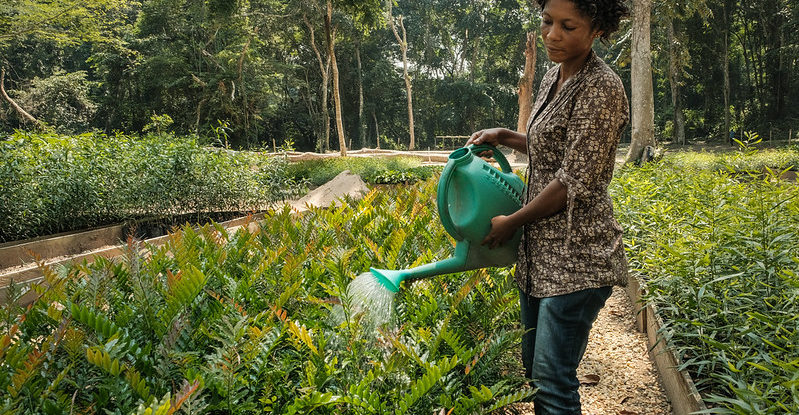
Think before you plant.
Randomly planting trees in ecosystems that have never been forests and reforesting with monoculture species can contribute to climate change mitigation, but often harms biodiversity, food production, offers no clear benefits for climate adaptation, and may displace communities, according to a new report produced by two top intergovernmental agencies.
Rather than considering biodiversity loss and climate change as separate challenges, they should be regarded as two sides of the same coin and be given equal consideration in policymaking to effectively mitigate their impact on ecosystems and meet international development goals, said the Intergovernmental Science-Policy Platform on Biodiversity and Ecosystem Services (IPBES) and the Intergovernmental Panel on Climate Change (IPCC), who have never previously collaborated, in a workshop report.
Current policies largely tackle biodiversity loss and climate change independently of each other, the report said, adding that actions designed to combat climate change can harm nature and vice versa, recommending remedies to make significant positive contributions in both arenas.
The Center for International Forestry Research and World Agroforestry (CIFOR-ICRAF), produced Principles for Successful Tree Planting last year in response to a proliferation of public and private tree planting initiatives, identifying best practices for strategic replanting. The brief encourages land restorers to consider “the right tree, in the right place for the right purpose” to ensure effective results.
As the planet warms, nature is less able to provide enough food, water and other ecosystem services, and these changes in biodiversity affect climate, particularly by affecting nitrogen, carbon and water cycles, said Hans-Otto Pörtner, co-chair of the scientific steering committee, which oversaw the IPBES-IPCC report.
“Solving some of the strong and apparently unavoidable trade-offs between climate and biodiversity will entail a profound collective shift of individual and shared values concerning nature – such as moving away from the conception of economic progress based solely on GDP (gross domestic product) growth, to one that balances human development with multiple values of nature for a good quality of life, while not overshooting biophysical and social limits,” he said.
Rapidly escalating changes in climate and biodiversity caused by human activities increasingly threaten nature, human lives, livelihoods and well-being around the world.
One of the most important actions is to prevent the loss and degradation of carbon- and species-rich ecosystems on land and in the ocean, especially in forests, wetlands, peatlands, grasslands and savannas; coastal ecosystems such as mangroves, salt marshes, kelp forests and seagrass meadows; as well as in deep water and polar blue carbon habitats, the report said.
Ecosystem restoration, which is cost effective and nature-based, is also key because natural environments provide habitats for plants and animals, enhancing the resilience of biodiversity as the climate changes. Healthy ecosystems also contribute to flood regulation, coastal protection, enhanced water quality, reduced soil erosion and ensures pollination, the report said.
Restoration has been promoted as a method to create jobs and income, particularly for Indigenous Peoples and local communities with access rights.
Reducing deforestation and forest degradation can contribute to lowering human-caused greenhouse gas emissions by a wide range from 0.4-5.8 giga tonnes of carbon dioxide equivalent each year, the report said.
It also recommends increasing sustainable agricultural and forestry practices to improve the capacity to adapt to climate change, enhance biodiversity, increase carbon storage and reduce emissions. Diversifying planted crop and forest species, agroforestry and agro-ecology, improving cropland and grazing management systems, such as soil conservation and less fertilizer use, all offer annual climate change mitigation potential estimated at 3 to 6 giga tonnes of carbon dioxide equivalent, the report said.
Other areas of concern include subsidies that support activities harmful to biodiversity – such as deforestation, over-fertilization and over-fishing – which should be eliminated, to better support climate change mitigation and adaptation efforts.
The large-scale planting of bioenergy crops in monocultures can be detrimental to ecosystems, but on a smaller scale, in combination with fossil-fuel emissions, dedicated bioenergy crops for electricity production or fuel may provide co-benefits for climate adaptation and biodiversity, the report said.
The ideas presented in the report will only be effective if substantial reductions in all human-caused greenhouse gas emissions are made.
“Land and ocean are already doing a lot – absorbing almost 50 percent of CO2 from human emissions – but nature cannot do everything,” said Ana María Hernández Salgar, chair of IPBES. “Transformative change in all parts of society and our economy is needed to stabilize our climate, stop biodiversity loss and chart a path to the sustainable future we want. This will also require us to address both crises together, in complementary ways.”
The workshop was the first collaboration between the two intergovernmental bodies.
We want you to share Forests News content, which is licensed under Creative Commons Attribution-NonCommercial-ShareAlike 4.0 International (CC BY-NC-SA 4.0). This means you are free to redistribute our material for non-commercial purposes. All we ask is that you give Forests News appropriate credit and link to the original Forests News content, indicate if changes were made, and distribute your contributions under the same Creative Commons license. You must notify Forests News if you repost, reprint or reuse our materials by contacting forestsnews@cifor-icraf.org.